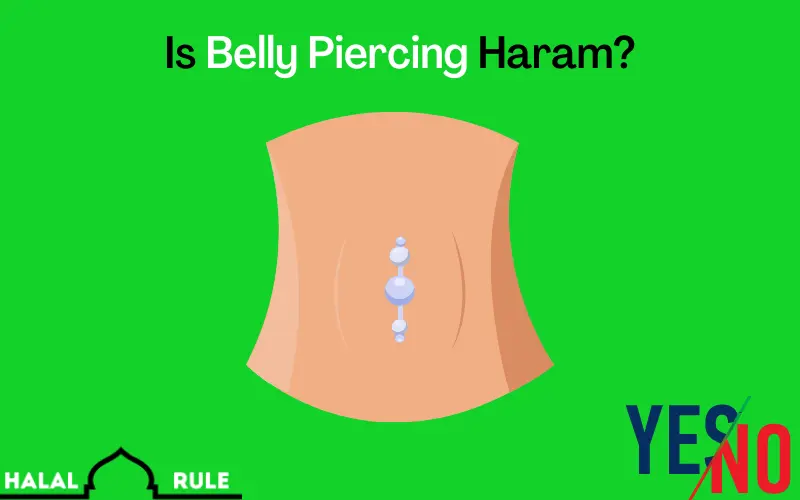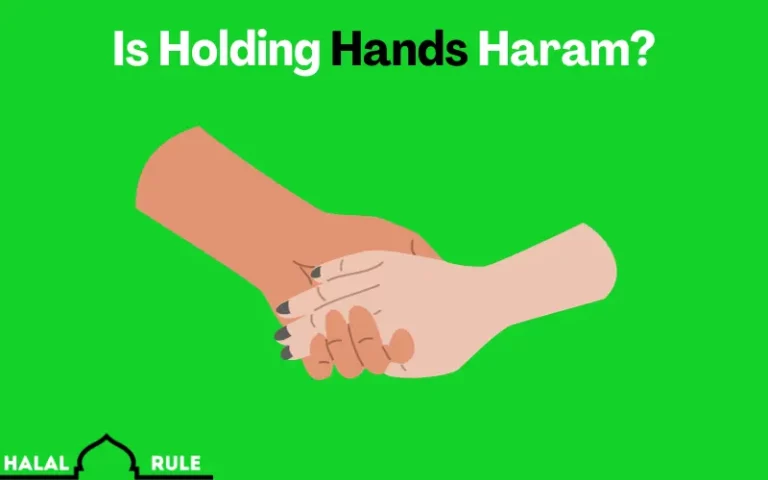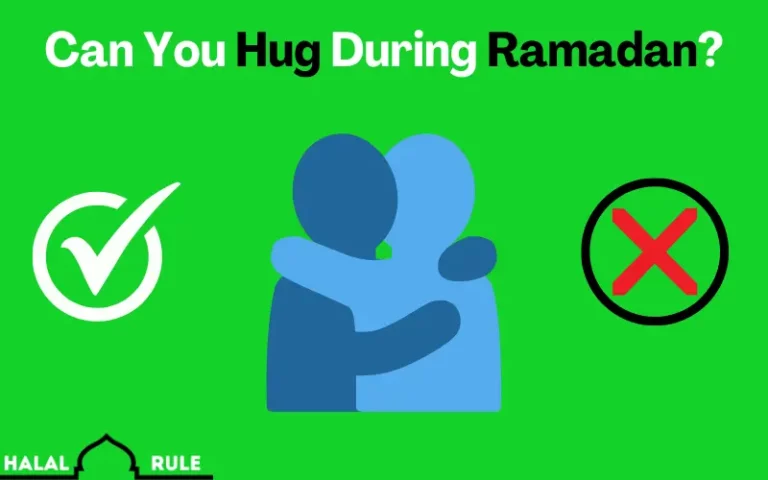Is Belly Piercing Haram In Islam? (Yes/No)
Navel piercing, also known as belly piercing or belly button piercing, has become an increasingly popular body modification.
Belly piercings can be seen as a form of self-expression and body art for many, but in the Islamic religion, there is a debate as to whether it is allowed or not.
If you’re a Muslim and confused about whether or not belly piercing is halal or haram, you’re in the right place.
In this article, we’ll answer is belly piercing haram or halal in Islam with proof. Also will explore the different views on this debate.

Is Belly Piercing Haram?
Yes. According to Islamic teachings, belly piercings are haram both for males and females.
The Prophet Muhammad (PBUH) clearly said no to making any changes to the body, including piercing. He said:
“Allah has cursed the one who makes tattoo and the one who gets it done.” (Sahih Al-Bukhari)
If you do belly piercing or, say, belly button piercing, you’re going against the teachings of Islam by making changes to your body.
You’re doing a change in Allah’s creation, and this is not allowed in Islam. As a Muslim, you have to obey the teachings of Islam.
However, the nose and ear piercings are different. Nose and ear piercings were allowed for women in the time of Prophet Muhammad (PBUH). This is because it doesn’t have any permanent change and also helps enhance women’s beauty.
Whereas, in the case of belly piercing, it is not allowed because it has a permanent change to the body. This means you can’t rewind your navel to its original state once it is pierced.
Also, while doing a belly piercing, you’re damaging your skin and causing harm to your body. This is something that Islam strictly forbids.
According to teachings, belly piercing has many health risks, including pain, swelling, and infection.
So, if we see all the reasons together, it’s clear that belly piercing is not aligned with the teachings of Islam, and hence it is haram.
You can also read is septum piercing haram.
Why Is Belly Piercing Haram?
The main reason why most Islamic scholars believe that belly piercing is haram is because it causes a permanent change in the body.
When you pierce your belly, it leaves a mark and changes the structure of what Allah has created. This is something that is not allowed in Islam.
Also, belly piercing has many health risks, like pain, infection, and even nerve damage in some cases. This causes us to go against the gentle and merciful teachings of Islam.
Apart from this, there are also many religious reasons why belly piercing is haram in Islam.
Firstly, it goes against women’s modesty and dignity. Piercing the belly is a form of self-decoration that does not align with Islamic teachings.
Secondly, it goes against Allah’s commands and laws. As Muslims, we are responsible for following all of his commands and avoiding any form of rebellion.
Finally, it is also viewed as disrespecting Allah, creating divisions amongst the believers. All of these reasons clearly explain why belly piercing is haram in Islam.
If you’re confused about nose piercing, you might also like reading is nose piercing haram for female.
How To Avoid Belly Piercing
The best way to avoid belly piercing is by following the teachings of Islam. We should do Allah’s will and try to stay away from anything that could be considered haram.
It is also important to consider the opinions of Islamic scholars before making any decisions regarding piercings. This will help you stay away from any haram and sinful activities.
Apart from this, the most important thing is to have a good understanding of what is haram and what is halal in Islam. This will help you make the right decisions and avoid anything that could be considered haram.
Such as now, you know that belly piercing is haram; you will not be tempted to do it even if all your friends are getting their bellies pierced.
And if someone still asks you to get your belly pierced, kindly explain to them the true teachings of Islam.
Also see is tongue piercing haram.
What To Do If You Have Already Pierced Your Belly
If you have already pierced your belly, then it is best to remove the piercing and repent for the sin.
This will help you get closer to Allah and make up for any wrongdoings that you have done.
You can also ask for forgiveness from Allah and repent for your sins in other ways, such as fasting, charity, or prayer.
Also, make sure to cover your belly whenever you go outside and practice modesty in accordance with Islamic teachings.
Lastly, pledge to stay away from any kind of haram activities in the future and focus on bettering your relationship with Allah.
Being a man if you like ear piercing, you must learn is ear piercing haram for men.
Understanding The Islamic Perspective On Body Modification
In Islam, the body is considered a sacred trust from God and therefore should be treated with respect. Any type of modification or alteration to the body, including piercings or tattoos, is seen as distorting the natural form that God has created.
Furthermore, there are specific guidelines in Islam regarding how one should present themselves in terms of appearance. These guidelines include modesty, cleanliness, and avoiding imitation of non-believers.
Health And Safety Concerns Regarding Belly Piercings
Aside from the religious perspective, there are also health and safety concerns associated with belly piercings. The piercing process itself can lead to infections or complications if not done properly.
In addition, the area around the belly button is considered a high-risk zone for bacteria growth due to its dark and moist environment. This can lead to infections and other health issues if proper care is not taken.
You might also like knowing why are tattoos haram but not piercings.
FAQs
Q. Is belly button piercing haram?
A. Yes, belly button piercing is haram, according to Islamic teachings. It causes a permanent change in Allah’s creation and has many associated health risks.
Q. Are belly piercings haram?
A. Yes, belly piercings are haram because they cause a permanent change in Allah’s creation and also come with many health-associated risks.
Q. Is belly piercing haram for female?
A. Yes, belly piercing is haram for females according to Islamic teachings. Both males and females are forbidden from changing Allah’s creation.
Q. Is it haram to get a belly piercing?
A. Yes, it is haram to get a belly piercing because it causes a permanent change in Allah’s creation and has health-related issues.
Q. Is navel piercing haram?
A. Yes, navel piercing is haram because it causes a permanent change in Allah’s creation and has many associated health risks.
Q. Is it haram to pierce your belly button?
A. Yes, it is haram to pierce your belly button because this causes a permanent change in Allah’s creation and has many associated health risks.
Q. Is navelpiercing haram?
A. Yes, getting any type of body piercing is considered to be ‘haram’ or forbidden in Islam. This includes navelpiercings.
Q. Is stomach piercing haram?
A. Yes, stomach piercing is also haram in Islam.
Q. Is showing your belly button haram?
A. Yes, in Islam, it is considered immodest for a person to show their belly button or any other part of their body that is meant to be covered. This includes both men and women.
Q. Are belly button piercings haram?
A. Yes, they are considered haram according to Islamic teachings.
Q. Is it haram to get a belly button piercing in Islam?
A. Yes, it is considered haram as it goes against the Islamic teachings of treating one’s body with respect and avoiding any alterations or modifications.
Conclusion
To conclude, belly piercings are haram according to Islamic teachings. This is because it causes a permanent change in Allah’s creation and also has many health risks associated with it.
It is best to avoid belly piercings and stay away from any haram activities. In Islam, only ear and nose piercings are allowed for women, which should not cause permanent changes.
I hope this article has answered is belly piercing haram and helped you understand why belly piercing is haram and how to stay away from it. May Allah guide us all toward the right path and give us the strength to make the right decisions. Ameen.






